
 |
|
|
Did
you expect as many participants as you got? It
seems to me that what makes this project so fun is that by listening to
instructions and watching everyone else participation, an individual can
feel less alone in his actions. That is, it was really easy to do these
actions in the group. Do
you think the piece was politically effective? Are
there upcoming projects? |
 |
|
| Why
do you find this type of protest effective? When we say that we regard the radioballett as a model, we do not mean that it is the only way to express disagreement with a certain situation. In Leipzig a participant criticized us, saying that the radioballett was unsuccessful since it didn’t harm the regime of control. He feared that the radioballett might become a substitute for other forms of protest that seem to be more radical. Or, to put it in another way: he missed the radical resistance (for him this would have been smashing the shop windows in the main station). We are sure that these militant practices can be very effective too, but this isn’t the point of the radioballett. Its effectiveness is its uncanniness. You say
that you want to “haunt a space” rather than “change
people”. What does this mean, and how does it work? Are
dispersed protests part of a new trend of activism? No one gets hurt from other people who are lying around where they are not supposed to be or from people begging. The problem is that we grow used to associating crime with disorder. This means that people are not allowed to be at a certain places just because of the paranoid ideas of shop-owners and others following common perceptions. Violence is certainly another subject, but the "crimes" that people who are thrown out of the privatized space commit are usually not violent - they are only treated as if they were. Why don’t they have the right to be there - only because other people practice every day to see criminals in them? I don’t know about the situation in the US, but in Germany it is much more likely to become victim of a crime in private space than in public. By the way: controlled space creates new victims: who knows how people discovered doing forbidden things like lying around are treated? Who will believe them if they are maltreated? In Hamburg the police are notorious for their racist attacks on people suspected of drug dealing. More controlled space means more space and more people under control of guards and policemen that might harm them. I
understand how it is law-making to establish rules of conduct, but how
is that privatization? do these laws have to do with capitalism and economy?
And if so, to what extent? |
||
| Germany wants to become the world power with a human face. | ||
| photo copyright: eiko grimberg | ||